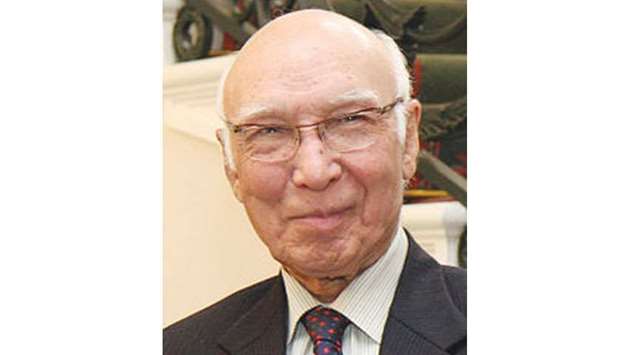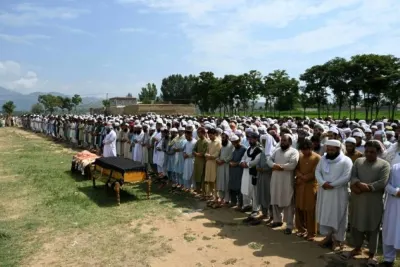Adviser to the Pakistan Prime Minister on Foreign Affairs Sartaj Aziz yesterday told Parliament that Pakistan will maintain a position of neutrality in the deepening Gulf crisis and will refrain from interfering in the affairs of other countries.
Briefing the Senate Standing Committee on Foreign Affairs on the ongoing diplomatic rift in the Middle East that began after Saudi Arabia, Egypt, the United Arab Emirates (UAE), Bahrain, Yemen and the Maldives severed their ties with Qatar, Sartaj Aziz said that the former army chief General Raheel Sharif had taken command of the 41-nation Saudi-led military coalition in his personal capacity and cannot be recalled.
During the committee’s session, Pakistan People’s Party Senator Kareem Khawaja voiced his dissatisfaction with Pakistan’s role in the Gulf crisis and added that the former army chief should be asked to return to the country voluntarily.
Aziz told the committee that General Sharif was not sent by the government to lead the alliance and, therefore, cannot be asked to return.
Aziz added that Pakistan Parliament’s resolution on the Yemen conflict will serve as the foundation for the role Pakistan will adopt in the current Gulf crisis.
He was referring to Parliament’s unanimous resolution in 2015 when Saudi Arabia launched a military operation against Yemen.
The resolution proposed that Pakistan “should maintain neutrality in the conflict so as to be able to play a proactive diplomatic role to end the crisis”. The government had decided at the time to continue with its pursuit of a diplomatic solution to the war in Yemen.
Committee Chairperson Nazir Sadiq said that Prime Minister Nawaz Sharif had not only met with Saudi King Salman bin Abdulaziz al-Saud as part of his mediational efforts in the Gulf, but also spoke with Qatari Emir on the phone regarding a resolution to the rift.
In its response to the Gulf crisis, Pakistan had stressed the need for unity in the Muslim world and urged the countries involved to engage in dialogue.
Earlier this month, lawmakers at the National Assembly expressed “deep concern” over the diplomatic rift and passed a resolution urging all countries to “show restraint and resolve their differences through dialogue”.
The Lower House of the Parliament also called upon the government to take concrete steps towards forging unity amongst the Muslim Ummah in the region.
Pakistan Tehreek-i-Insaf’s chief whip in the National Assembly Shireen Mazari called for Pakistan to remain neutral and “play a positive role”.
A six-member Qatari delegation, headed by businessman Abdulhadi Mana al-Hajri, reportedly visited Pakistan days after Saudi Arabia and allies severed ties with the small gas-rich country.
The delegation relayed a message from the Qatari Emir asking Pakistan to play a positive role in resolving the diplomatic crisis engulfing the Middle East.
The Foreign Office, however, officially denied having any knowledge of the visit and stressed the need for unity among Muslim countries.
The Foreign Office said that Pakistan wishes to see the crisis resolved in the best possible manner.

Sartaj Aziz


